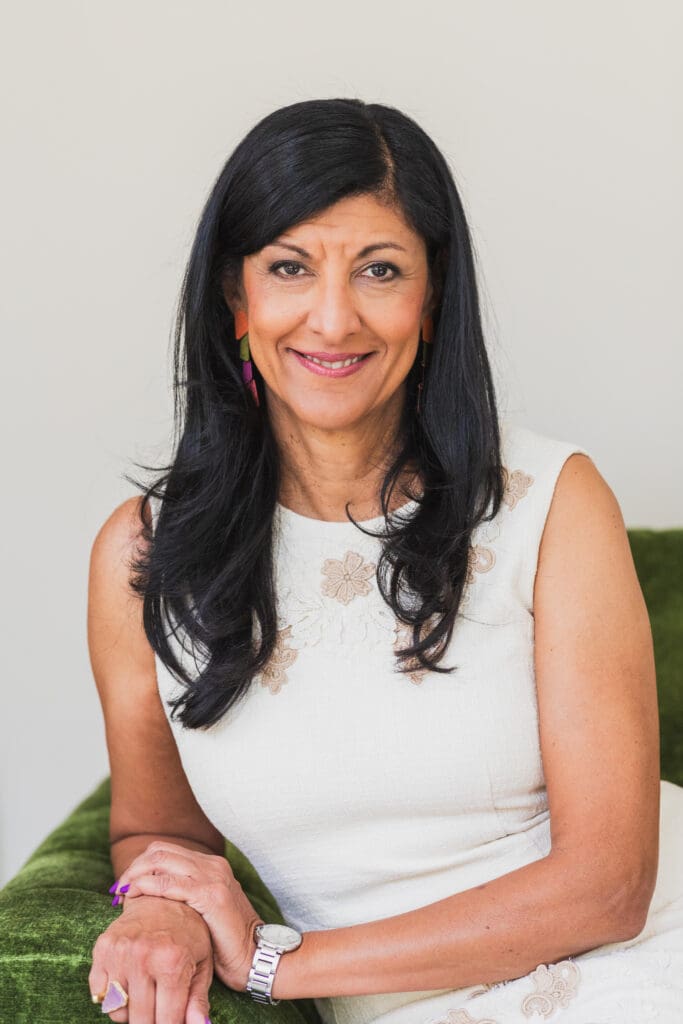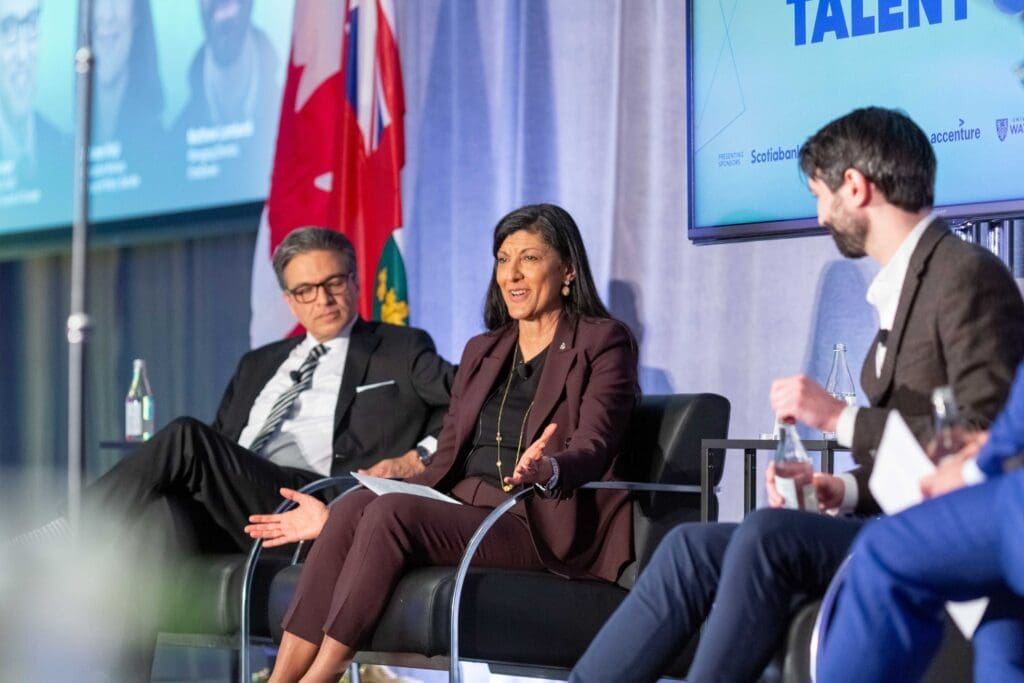As our society evolves, so too does the narrative around aging and retirement. With nearly a quarter of Canada’s population set to be over 65 by 2030, the idea of later life as a period of retreat is being replaced by a vision of growth, purpose, and impact. At the forefront of this shift is Zabeen Hirji, former Chief Human Resources Officer at RBC, who has redefined what it means to embrace life’s “third act.”
After a trailblazing 40-year career, Zabeen didn’t step back—she stepped forward, asking herself transformative questions: “Who do I want to be? What impact can I make?” The answers inspired the Purposeful Third Act (P3A), a movement that reframes later life as a time to align personal growth with societal and environmental impact.
In this Q&A, Zabeen shares how she’s disrupting the traditional concept of retirement, why the rise of the Wisdom Economy makes later-life contributions invaluable, and how others can follow her lead to design a meaningful, joy-filled third act. Whether you’re at the beginning of your career or considering your next chapter, Zabeen’s insights will leave you inspired to think differently about aging, work, and purpose. —Noa Nichol
What inspired you to create the Purposeful Third Act (P3A) movement, and how does it redefine the traditional concept of retirement?
The Purposeful Third Act was catalyzed by a deeply personal journey. After retiring from my rewarding, full-time, and intense executive career at RBC, I, like many others at that stage, faced a pivotal moment of reflection: Who have I been? Who do I want to be? Only after answering those questions did I turn my focus to finding the answer to What do I want to do?
In a nutshell, this journey revealed an opportunity to challenge and disrupt the outdated notion that retirement means winding down and stepping away from a life of impact.
With longer lifespans — even more so for women, who live six to eight years longer than men — and healthier lives, we are gifted not just more years but the chance to be more purposeful. Meaning we can channel decades of wisdom — experience, emotional intelligence (e.g. empathy, judgment), and relationships (social capital) into making meaningful social change.
For me, this journey reframed retirement as a pivot to deeper purpose — to lead from behind, mentor with empathy, and make contributions that elevate both individuals and society. The P3A movement is not just a call to action; it’s a redefinition of what leadership and impact can be in this transformative stage of life.
How did your transition from corporate leadership at RBC to purpose-driven work influence your personal growth and sense of fulfillment?
The transition from Chief HR Officer at RBC to my third act felt both exhilarating and daunting. I was fortunate that, in my second act, the bank’s values and purpose aligned with mine — not entirely surprising, as I led the work in both those areas between 2001 and 2014. However, leaving the corporate world meant stepping away from the titles and external recognition that had shaped much of my professional identity. What I gained, however, was profound: the freedom to be guided by my north star, align my actions with my values, and embrace authenticity.
Some call this process reinvention. I characterize it as a rediscovery of what truly matters — not just the impact I can make, but also the joy that comes from inspiring others, connecting people to make magic happen, and having the space to follow my curiosity, learn, and grow. I’ve created a portfolio of P3A roles and activities, which allows me to live my purpose every day.
What advice would you give to someone approaching their later years and wondering, “What now?”
First, let go of the idea that your best years are behind you. Instead, ask yourself: Who do I want to be? Who have I been, and what’s left to be done? Then, ask: What lights me up? What lasting impact do I want to make?
This takes work. It’s not a “one and done” process. I sought help along the way — informal advisors, coaches, and people who listened, challenged, and nudged me. They encouraged me to dream big (again), be bold, and take action to get there.
This is not the time to shrink away from opportunity, but to lean into your accumulated wisdom. Think about the power of using your experiences to create impact — whether by advising and sharing knowledge and networks with not-for-profits and the public sector, mentoring and guiding younger people, or advocating for social or environmental change.
P3A invites you to redefine what success looks like, focusing on contribution, learning, and the joy and fulfillment that comes from aligning your actions with your values. Approaching this with intentionality can make the difference between good and great.
How does the Purposeful Third Act address societal challenges like ageism and the undervaluation of older professionals in the workplace?
P3A directly challenges the misconception that older professionals have less to offer. Instead, it highlights the critical contributions of seasoned leaders — institutional knowledge, expertise, emotional intelligence, and judgment — all of which are essential in today’s workplaces.
By 2030, approximately 23 per cent of Canada’s population will be over 65. At the same time, we face skills and talent shortages, along with productivity challenges. If we don’t address this, our quality of life will erode. We need to embrace the wisdom economy. Wisdom goes beyond simply having knowledge; it’s about applying that knowledge with empathy and insight. It’s also about being adaptable and committed to continuous learning to navigate the complexities of life and work.
P3A focuses on mentoring and coaching younger workers on human skills, driving innovation and growth through intergenerational collaboration, and leveraging social capital to tackle our productivity challenges and build stronger economies. Achieving this requires a shift in mindset — viewing aging as an asset rather than a depreciating value.
How can businesses and organizations embrace later-life work as a driver of innovation, mentorship, and progress?
Organizations need to move beyond the mindset of “retirement as exit” and embrace “retirement as transition.” By creating roles for seasoned professionals to teach, mentor, advise, and collaborate — and by tapping into their skills and knowledge with greater intentionality — businesses can retain critical expertise and foster innovation.
Phased retirement programs, flexible work arrangements, reciprocal mentorship, and intergenerational teams are just a few examples of how organizations can leverage the unique strengths of later-life workers. This approach isn’t just about addressing talent gaps; it’s about recognizing that experienced leaders are a strategic advantage in building resilient, future-ready workplaces.
What role does emotional intelligence play in the P3A, and how can older professionals leverage this strength to create impact?
Emotional intelligence — the ability to connect with others, navigate complexity, and inspire trust — is one of the most powerful tools that older professionals bring to the table. In the P3A, emotional intelligence becomes a catalyst for meaningful leadership. It empowers leaders to mentor with empathy, build bridges across generations, and foster environments where diverse perspectives thrive.
By leveraging this strength, seasoned professionals can guide others toward growth, creating a ripple effect of positive change in their workplaces and communities.
Can you share examples of how individuals in their “third act” have used their skills and resources to create social or environmental impact?
Absolutely. I’ve seen retired executives mentor young entrepreneurs, helping them navigate challenges with confidence. Others are teaching in higher education institutions, joining not-for-profit boards or advisory groups, and playing active roles in supporting CEOs. Some have even founded initiatives addressing pressing issues like climate change or mental health.
Many also include business activities in their portfolios — as consultants, advisors, or members of corporate boards. I appreciate this approach as it keeps people current and commercially engaged.
For example, individuals like Ilse Treurnicht, Anil Arora, Denise Amyot, and Ken Freeden are excellent examples. I’ll be profiling them on my website, which launches in February.
As for myself, one of my goals is scaling P3A into a movement. My return on this investment is building inclusive prosperity in Canada rather than seeking a financial return.
What steps can communities and employers take to support and engage older professionals in meaningful ways?
Communities and employers can start by fostering a culture of inclusion and recognizing the unique strengths that older professionals bring. Ageism needs to be tackled head-on — it’s an issue that doesn’t receive enough attention from employers. Addressing it is not only the right thing to do, but also the smart thing to do. This includes creating mentorship networks, consulting opportunities, and flexible roles that align with their expertise.
Employers should also champion reciprocal mentorship, where wisdom flows between generations. On a community level, providing platforms for civic engagement and purpose-driven initiatives ensures that older professionals remain active, connected, and impactful.
What is your personal vision for the Purposeful Third Act movement, and how do you see it reshaping societal perceptions of aging and leadership in the next decade?
My vision for P3A is to create a paradigm shift — disrupting how we value this stage of life and fostering a society where aging is seen not as a decline but as a phase of profound contribution, learning, and joy.
Over the next decade, I hope to see organizations, governments, communities, and individuals embracing this vision, with thousands of people leading purposeful third acts. Together, we can transform perceptions of aging, proving that the later years are not a closing chapter, but a third act filled with impact, learning, connection, and joy.




January 15th, 2025 at 12:24 am
GiftBasketWorldwide.com is a leading online platform that offers a wide range of curated gift baskets, cakes, and gourmet treats for every occasion. With a focus on quality, creativity, and customer satisfaction, we strive to make gift-giving a memorable experience for both the sender and the recipient. https://www.giftbasketworldwide.com/spain/cakes